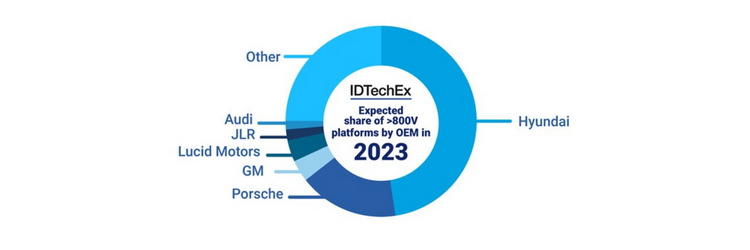800V Electric Vehicles Roll with SiC Power Electronics
A new IDTechEx report, “Power Electronics for Electric Vehicles 2023-2033,” provides a deep-dive into EV power electronics based on rapidly evolving semiconductor and package materials, including SiC and GaN semiconductors, and how they stack up against Si chips. Also discussed are die-attach materials, wire bonding, thermal management, etc.
While Si IGBTs dominated medium-to-high power devices for the past two decades, WBG materials SiC and GaN enable greater capabilities for high voltage and high power-density modules operating at higher temperatures. Moving from 350-400V to 800V are higher power levels of DC fast charging (DCFC), 350kW, and drive cycle efficiency gains.
Also, the IDTechEx report covering charging, “Charging Infrastructure for Electric Vehicles and Fleets 2022-2032,” states that 3 million AC charging installations were made in 2022, compared to ~50,000 DCFCs over 100kW. DCFC does not necessarily drive a move to 800V but is more optimal.
The efficiency argument for 800V is strong. Joule losses are reduced, and high-voltage cabling is downsized. Combined with SiC MOSFETs, 5-10% efficiency gains are typical. Those gains can translate into downsizing the battery, cost savings, and improved range.
Once the supply chain challenges are solved, such as wire harness shortages resulting from the war in Ukraine, adoption is expected to rise. Hyundai is having success with its 800V platforms. Sales more than doubled in South Korea to around 70,000 units/year, driven by the popularity of the IONIQ 5 and Kia EV6 mainstream vehicles. Hyundai is expanding its SiC supply partnerships, adding Onsemi and STMicroelectronics to existing relationships with Infineon and Vitesco.
It’s going to take more than 800V platforms to provide efficiency. Drive cycle efficiency can be improved with battery chemistry to solar bodywork, high voltage cable reduction/vehicle, 600V SiC, and improved design.
To learn more, visit www.IDTechEx.com/PowerElec.

